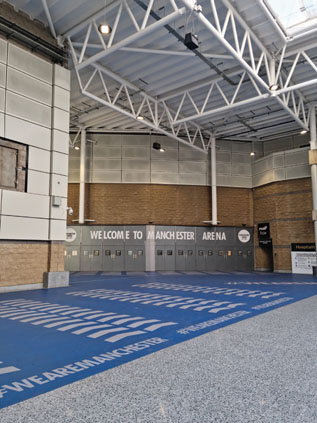More paramedics could and should have been in the City Room (pictured) after the Manchester Arena suicide bombing on the night of May 22, 2017, ‘using their skills to triage and, where necessary, using their life saving skills’, said the Arena Inquiry chairman, Sir John Saunders, introducing volume two of the Inquiry reports, covering emergency response.
Sir John said that many things had gone badly wrong on that night, but denied that he had looked for scapegoats. He said: “Some may think that to criticise individuals who were faced with an extremely difficult situation is harsh but we rely on people in command positions to make the right decisions when faced with a complex emergency. None of them intended to make the wrong decision. Some had not had sufficient instruction or training and others were doing their best to balance the need to help those who were injured with ensuring that people under their command were not put in a position which carried excessive risk.”
Sir John singled out JESIP, that ‘almost completely failed on the night of the Arena Attack’. He said: “JESIP is designed to ensure that any rescue attempt involving more than one of the emergency services is co-ordinated so that all follow the same plan and share information so that well informed decisions can be taken. Had JESIP worked on May 22, things could and should have been very different.”
As for the fire service, had they been on the scene as quick as they could have, ‘they would have removed the injured using proper equipment which would have been safe and quick. Instead, the injured had to be removed on railings and pieces of cardboard’, Sir John said.
Of more direct interest to the private security industry, Sir John addressed what he termed ‘the care gap’, covered in part 20 of volume two (and more in the December 2022 print edition of Professional Security Magazine); ‘that is the inevitable gap between an event, such as this bombing, happening and the arrival of people trained to give expert medical help. To try to reduce that gap what we need to ensure is that there are suitable people on site at places such as the Arena who are able to give emergency lifesaving assistance which may result in people surviving who otherwise would not if they had to wait for the arrival of medical professionals. This could be included as part of the Protect Duty but we will need to see what the Government proposes’.
He repeated his ‘encouragement’ for the Duty – a legal responsibility on places to have regard for countering terrorism – that he aired on publication of volume one, covering security and stewarding of the Arena, in summer 2021. Sir John ended his launch of volume two by making plain that it is now for the politicians – the Home Secretary in particular – to act on the Inquiry findings and recommendations. Sir John closed with the hope that the Inquiry would make a difference, ‘and that things that went wrong on May 22 will never be repeated. This is a hope which is shared by the Home Secretary and I hope that we can work together to achieve that aim’.
The near 900 pages of volume two and appendices are for download on the Manchester Arena Inquiry website.
For official reactions to volume two, click here.










